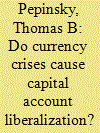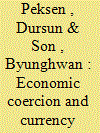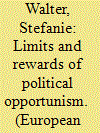| Srl | Item |
| 1 |
ID:
118160


|
|
|
|
|
| Publication |
2012.
|
| Summary/Abstract |
A central argument in the literature on economic crises and policy reform is that currency crises lead governments to liberalize their capital accounts in order to establish their credibility to international markets. I argue that the reverse is true: currency crises lead governments to restrict capital flows as a form of self-help. Using instrumental variables to account for the possibility that capital account liberalization causes currency crises, I show that currency crises are robustly associated with capital account closure across developing countries. The findings refocus the debate on currency crises and capital account liberalization and contribute to larger debates about the role of critical junctures in prompting neoliberal policy reform.
|
|
|
|
|
|
|
|
|
|
|
|
|
|
|
|
| 2 |
ID:
140078


|
|
|
|
|
| Summary/Abstract |
Despite significant research on the efficacy and inadvertent humanitarian and political effects of economic sanctions, surprisingly little is known about the possible economic and financial consequences of sanctions for target economies. Synthesizing insights from the currency crisis literature with sanctions scholarship, we argue that economic sanctions are likely to trigger currency collapses, a major form of financial crisis that impedes economic growth and prosperity. We assert that economic coercion instigates currency crises by weakening the economy and creating political risks conducive to speculative attacks by currency traders. To substantiate the theoretical claims, we use time-series cross-national data for the 1970–2005 period. The results from the data analysis lend support for the hypothesis that sanctions undermine the financial stability of target countries. The findings also indicate that the adverse effect of economic coercion on the financial stability of target economies is likely to be conditioned by the severity of the coercion and the type of actors involved in the implementation of sanctions. The findings of this article add to the sanctions literature demonstrating how economic coercion could be detrimental to the target economy beyond the immediate effect on trade and investment. It also complements and adds to the literature on political economy of currency crises that has so far overlooked the significant role that economic coercion plays in financial crises.
|
|
|
|
|
|
|
|
|
|
|
|
|
|
|
|
| 3 |
ID:
092339


|
|
|
|
|
| Publication |
2009.
|
| Summary/Abstract |
This paper analyzes the stability of alternative exchange rate regimes in the face of substantial capital mobility. This issue often goes under the label of the unstable middle or the two-corners hypotheses. We argue that both the issues of why the middle is unstable and how far toward the extremes of fixed or flexible exchange rates countries need to go in order to substantially reduce the likelihood of currency crises depends crucially on political economy as well as technical economic considerations. We undertake a large N empirical study that extends the currency crisis literature by using a new classification of exchange rate regimes from the IMF and taking into account the interactive effects between government strength and alternative exchange rate regimes on the probability of currency crises. We find that weak governments increase the likelihood of currency crises under any type of exchange rate regime, and as our theory suggests, this effect is strongest under adjustably pegged exchange regimes.
|
|
|
|
|
|
|
|
|
|
|
|
|
|
|
|
| 4 |
ID:
086992


|
|
|
|
|
| Publication |
2009.
|
| Summary/Abstract |
Politicians are often assumed to be opportunistic. This article examines both whether there is a limit to this opportunism and whether voters reward policy makers for opportunistic behaviour. By looking at currency crisis situations, the article presents a graphic rational opportunistic political business cycle model in which incumbents face a tradeoff between their wish to signal competence and the economic constraints imposed by the crisis. It analyses how electoral incentives affect policy makers' management of currency crises and how this management in turn affects the subsequent election outcome. The empirical results of probit models with selection using a sample of 122 crises in 48 industrial and developing countries between 1983 and 2003 confirm the model's prediction that under certain circumstances some types of policy makers do indeed have incentives to deviate from optimal policy in the run-up to elections - and that voters reward this behaviour by re-electing policy makers who follow such strategies. However, there is a limit to the readiness to manipulate: when speculative pressure is too severe, incumbents no longer manipulate policy but implement the least painful policy option instead.
|
|
|
|
|
|
|
|
|
|
|
|
|
|
|
|